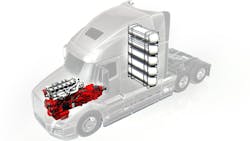Werner plans to buy 500 Cummins X15H hydrogen engines
Omaha, Nebraska-based Werner Enterprises, one of the largest fleets in North America, signed a letter of intent to purchase 500 Cummins’ X15H hydrogen internal combustion engines, which are expected to go into full production later this decade.
The two companies announced earlier this year that Werner plans to integrate Cummins’ 15-liter natural gas and hydrogen engines into its fleet, according to a press release. Cummins' fuel-agnostic platform supports hydrogen, natural gas, and diesel fuels with different head units on the X15 series to support the different fuels. With more than 10,000 commercial vehicles, Werner ranks No. 12 on the 2022 FleetOwner 500: For-Hire list.
See also: Cummins is finding more than one way to decarbonize fleets
“At Werner, we’re committed to a 55% reduction in greenhouse gas emissions by 2035 because we recognize the important role our sustainability efforts play,” said Derek Leathers, Werner chairman, president, and CEO. “Our customers are showing increased interest in more sustainable choices in the marketplace, and we see significant potential in utilizing Cummins’ fuel agnostic platform to continue the momentum toward reducing our carbon footprint.”
Since announcing the fuel-agnostic platform, which includes the hydrogen option in both the 15-liter and 6.7-liter displacements, Cummins has responded to customer interest globally about the potential of the platform, and hydrogen in particular, according to the press release.
“Our fleet customers have shown tremendous enthusiasm for Hydrogen internal combustion engines, which we believe can be a breakthrough technology essential to reaching Destination Zero,” said Jim Nebergall, GM of Cummins hydrogen engine business. “With enough interest, we believe we can manufacture this technology at scale yet this decade providing customers with an option that is a low initial cost, extended vehicle range, powertrain installation commonality, and end user familiarity.”
Destination Zero is Cummins’ strategy to reduce the greenhouse gas and air quality impacts of its products and reach net-zero emissions by 2050.
See also: The dawn of hydrogen trucks
Hydrogen engines offer OEMs and end-users the benefit of adaptability by continuing to use familiar mechanical drivelines with vehicle and equipment integration, according to the press release. This mirrors current powertrains while continuing to provide the power and capability for meeting application needs. Significant reuse of parts and components from Cummins’ existing platforms drives scale advantages on cost and is also projected to deliver reliability and durability equal to diesel.
Hydrogen engines can use zero-carbon green hydrogen fuel produced by Cummins-manufactured electrolyzers. The projected investment in renewable hydrogen production globally will provide a growing opportunity for the deployment of hydrogen-powered fleets utilizing either Cummins fuel cell or engine power.
See also: Hydrogen’s uphill climb
“We are pleased to see the leadership of customers like Werner Enterprises, who are exploring solutions like our fuel agnostic platform to help their own customers. The future will include many solutions to help customers decarbonize, and we believe hydrogen internal combustion engines will play an important role,” said Brett Merritt, VP of on-highway engine business at Cummins.
Cummins will showcase its commitment to decarbonization at the IAA Transportation 2022, the industry’s largest tradeshow, in Hannover, Germany, Sept. 20-25. Cummins will display both medium- and heavy-duty hydrogen products to highlight the technology’s ability to support decarbonization across multiple duty cycles.
This article originally appeared on FleetOwner.com.
